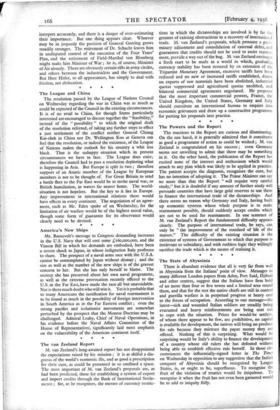The Powers and the Report The reactions to the Report
are curious and illuminating. On the one hand, it is generally admitted that it constitutes as good a programme of action as could be wished ; M. van Zeeland is congratulated on his success ; even Germany seems not unwilling to admit that there may be something in it. On the other hand, the publication of the Report has excited none of the interest and enthusiasm which would attach to any plan which was likely to be applied in practice. The patient accepts the diagnosis, recognises the cure, but has no intention of adopting it. The Prime Minister can say no more than that the Report "will require very careful study," but it is doubtful if any amount of further study will persuade countries that have large gold reserves to use them to finance the international trade of the dictatorships. And there seems no reason why Germany and Italy, having built up economic systems whose whole purpose is to make rearmament possible, should suddenly accept credits which arc not to be used for rearmament. In one sentence of M. van Zeeland's Report the fundamental difficulty appears clearly. The purpose of international trade, he says, can only be "the improvement of the standard of life of the masses." The difficulty of the existing situation is the existence of systems of Government to which that purpose is irrelevant or subsidiary, and with ruthless logic they willingly sacrifice the trade which is the means of realising it.
* * * *














































 Previous page
Previous page